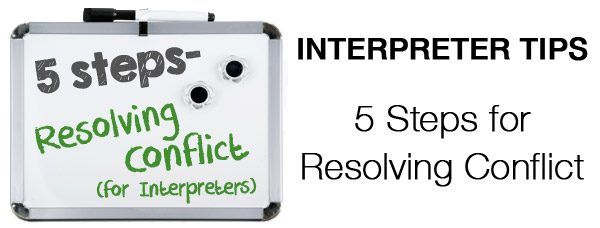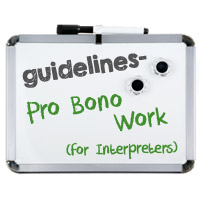
Interpreter 4-1-1: 5 Steps for Resolving Interpreter Conflicts
Interpreting is 99% about being able to work with other people - having good soft skills and good people skills. These aren’t something that everyone is blessed with naturally. It is important to take time to work on and improve these skills.
When have you butted heads with a co-worker? What caused it? Notice I didn’t ask who was at fault or who was to blame. What really caused the conflict? A miscommunication? An age difference? A power difference? Assumptions? How did you resolve the issue? What are some successful strategies?
Here are 5 steps for resolving interpreter conflicts:
1. GET PERSPECTIVE
- Take time to cool off.
- First impressions matter and can affect how people work together.
- Often times negative interactions are a result of assumptions.
- Realize that the issue is coming from incongruent expectations.
2. LISTEN
- Try to see the situation from other viewpoints.
- Explain your point of view and give them the chance to do the same.
- Using the words “Help me understand…” shows that you value the other person and their opinion.
3. BE RESPECTFUL
- Strive for mutual understanding and respect.
- Show them respect.
- Don’t bring others into it.
- Talk privately.
5. COMMUNICATE
- You can say anything - it all depends on how you say it.
- Don’t just focus on the problems, come up with solutions.
- The tried and true use of “I” statements really does work.
- Let them know, but don’t point fingers even if it was their mistake.
- If you’re wrong, apologize and try to make it right. (Even if you don't think you're wrong, you could say, "I'm sorry I hurt your feelings" or "I'm sorry you feel that way.")
5. MOVE ON
- Learn to let some things go.
- Move past it and don’t remain bitter.
- Live and learn. It is all part of growing professionally and personally.
 Brenda Cartwright is a Coda, seasoned interpreter, a master teacher, well known presenter, and author of several best selling sign language and interpreting textbooks from the RID Press. For 35 years Brenda was the Chair of the Sign Language Interpreter Program at Lansing Community College in Lansing, Michigan.
Brenda Cartwright is a Coda, seasoned interpreter, a master teacher, well known presenter, and author of several best selling sign language and interpreting textbooks from the RID Press. For 35 years Brenda was the Chair of the Sign Language Interpreter Program at Lansing Community College in Lansing, Michigan. Interpreter Q & A: Letting Interpreter Credentials Lapse
Interpreter Q & A: Letting Interpreter Credentials Lapse Interpreting 4-1-1: Guidelines to Help Interpreters When Doing Pro Bono Work
Interpreting 4-1-1: Guidelines to Help Interpreters When Doing Pro Bono Work Interpreter 4-1-1: Tax Tips for Interpreters
Interpreter 4-1-1: Tax Tips for Interpreters







Do you have other tips for resolving interpreter conflicts? Share your thoughts in the comments below.